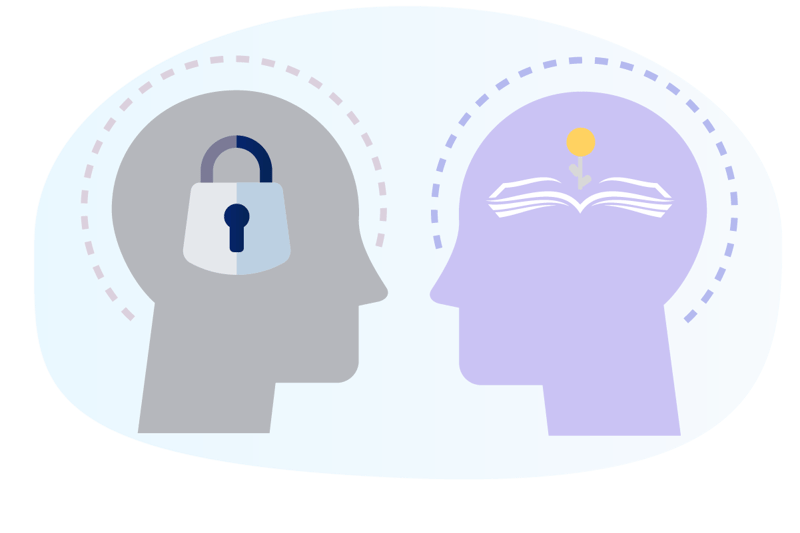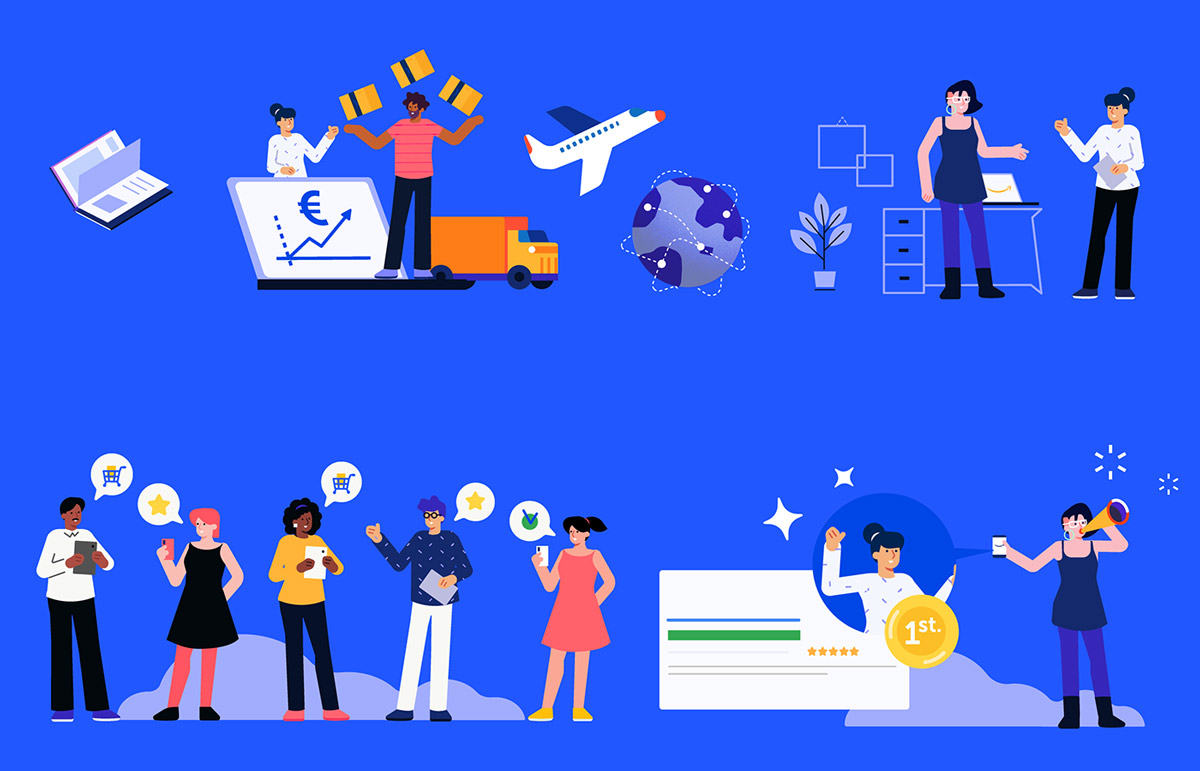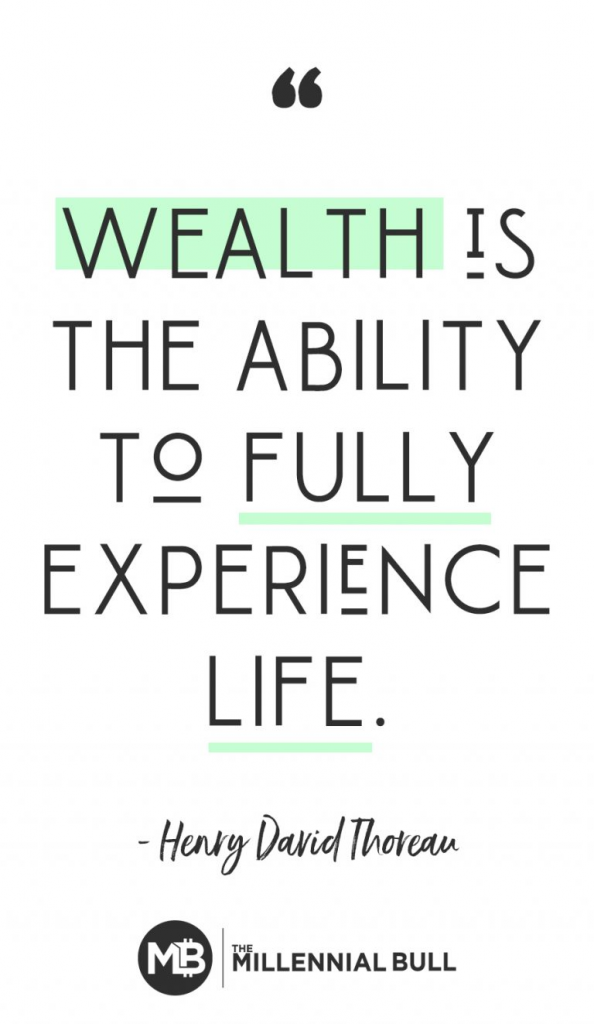This is the 4.0 era with a “dizzying” change, requiring marketers to adapt quickly.
Understanding your mindset is important to upgrade your thinking, creativity and “survival” skills in the face of fierce competition.
In this article, we will learn all the information around the topic of What is Mindset? Mindset refers to human qualities such as intellect and talent – fixed or changeable traits.Thinking plays an important role in how you deal with life’s challenges. After receiving and processing information, each person will have different reactions and expressions – Mindset is the process of “facing” and offering solutions.
What types of mindsets are there?
Stanford psychologist Carol Dweck spent some time researching mindsets in 2006 and found that the two most common types of mindsets are as follows:
Growth Mindset
Growth Mindset people always believe that just trying to develop and practice hard can upgrade their talents and thinking. When they encounter failure, although they know that they cannot change the result, for them it is a great lesson to improve themselves and continue to grow.

3 Important factors to develop a growth mindset. We have learned about what a growth mindset is, but to develop the best growth mindset, keep in mind these 3 important factors:
- Consider growth mindset to be the right thing to do to resolve to change your mindset.
- Learn to share with others thoughts and methods to help improve yourself through Growth Mindset.
- When your mind is in a fixed mindset, motivate yourself to get rid of negative things by expanding your thinking to a growth mindset and telling yourself you can do it.
Fixed Mindset
Fixed Mindset people believe that they have fixed abilities, talents, and qualities that cannot be changed. When they are in a challenging situation or accept failure, it means they will not keep trying.

Example of Mindset:
Surely you remember the story of Turtle and Rabbit – a good example of these 2 types of Mindset.
During the race, Rabbit proudly assumes that he will win against Turtle. Evidence shows that, when running quite far from turtles, rabbits have decided… Go back to sleep! On the contrary, the Turtles always strive to win.
In the end, Turtle finished first and Rabbit, because he fell asleep, lost. Based on the 2 mindsets above:
- The rabbit symbolizes the Fixed Mindset, always complacent about what is already there without trying to grow more.
- Turtles symbolize Growth Mindset, always trying to improve themselves and striving to win.
Which mindset are you leaning towards?
- If you believe that just trying to develop a talent or skill by practicing constantly, then you belong to the Growth Mindset.
- On the contrary, when you are in a difficult situation, you find enough reasons to refuse to complete a job such as: I do not have enough knowledge / skills, I do not know how to do … you belong to the Fixed Mindset.
The good news is, we can change our mindset by spending more time researching, learning, and putting in the effort to complete it.
Product Mindset
Whether it is a long-standing reputable brand or “immature” startups, Product Mindset is the core factor in the business activities of all businesses.
This skill determines the success of a product in the research phase => production => completion. Because a good new product can satisfy the needs of users and increase sales, helping businesses develop sustainably.
And to make a high-quality product, businesses must have a different and novel mindset to attract customers to interest and buy.
Mindset Transformation
Mindset transformation is quite commonly used today because the term is associated with success. Like the upheavals that happen constantly in life. Human thinking will also be influenced and subject to change.
A positive mindset, knowing how to change to adapt to any unexpected situation will help you form quick reflexes and handle all problems effectively. Therefore, always train your mindset to improve your self-worth better.
The Importance of Mindset
Why do marketers focus on mindset building? Understanding the importance of mindset will help you take a different view:
- Mindset directly affects how you take in and solve problems/challenges. People with a Growth Mindset will always look at the positives to come up with the best treatment method. Meanwhile, conservatives will easily “surrender.”
- Mindset affects the way people think, feel, and see things in their lives.
- Mindset is a prognostic factor to the behavior and attitude of each person when falling into unforeseen situations.
4 Must-Have Mindset of a Marketer 4.0!
Technological and digital innovations have a huge impact on the mindset of marketers at work.
In fact, if marketers have creative thinking and adapt quickly to all new trends, they will create more success. So how to become a good marketing expert in the 4.0 era? Practice these 4 mindsets:
Thinking about Automation
A Linkedin report in 2018 listed the mindsets required of marketing, with an emphasis on adaptability, creativity, and persuasion. Although machines are an important part of their lives, they cannot automatically combine technique and emotion in their work. This ability helps people think logically and apply “emotional” factors in the right direction to “dominate” the market.

Emotional Thinking
AI is a great tool that provides the necessary data about the target audience, market trends for marketers. However, no matter what new technology is, it is impossible to replace the instinct to create and promote new things to target customers correctly.
People will digitally plan and produce content based on user preferences/behaviors to build credibility, nurture loyalty, and drive the best results.
Emotions are important for people to believe in themselves, as well as take advantage of suggestions from AI tools to determine effective customer approaches.
Thinking about Opportunities and Challenges
Marketers’ biggest challenge is their ability to adapt and be constantly creative to keep up with market changes. Therefore, the pressures of marketers are great – requiring them to always contribute and maintain a stable attitude and productivity.
Thinking about Soft and Hard Skills
The old techniques have been gradually replaced with a new set of mindset skills that marketers must hone if they want to survive in the long run:
- Adaptation: In the field of marketing, it is very low to know in advance future market changes. Therefore, marketers must always be in the mood to adapt quickly to new things to create appropriate marketing strategies.
- Creativity: Eliminating media thinking, marketers 4.0 must have creative thinking, regularly delivering new ideas/inventions to enhance brand power and overcome all challenges in today’s digital.
- Collaboration: To execute successful business activities, marketers need to understand the importance of collaboration, by working closely with relevant departments to gain new market share and achieve revenue.
- Agility: If you take the trouble to explore and improvise quickly to create trends, marketers will bring great success to businesses, not only improve brand recognition, attract many new customers but also increase profits as expected.
- Leadership: This is a must-have skill of leads/leaders to convey knowledge/experience and strong work inspiration to team members. When a team is strongly determined and has a deep understanding of Digital Marketing, it will produce the best results.

3 Mindset Conversion Trends for Every Marketer
Understanding the prevailing Mindset trends will help marketers catch up with users’ thoughts to come up with the best marketing strategy.
Unique ad interface design
Previous marketers have learned how to optimize their marketing strategy through media buying to increase their reach, typically advertising.
This is a great way to reach a wide range of viewers at different points and limit audience duplication. However, there will be people watching your ad over and over again or there will be people who just skim by.
Today’s modern digital technology allows businesses to easily reach their target audience at any given time and have tight control over duplication or ad views.
The biggest problem is that users are gradually overwhelmed by the dense amount of advertising. Therefore, your brand interface must be unique and fresh to attract them to click.
But it’s all a normal mouse click if they don’t act on the wishes of the business. Therefore, you need to ensure a seamless experience at first sight. This will leave a strong impression on the hearts of users and motivate them to look for you more.
Design messages to enhance the experience
By understanding the importance of mindset, marketers have focused on creating the right message and getting it to the right consumers at the right time.
Today, it is easy for users to interact with brands through websites, operate in a traditional retail environment, or view products/services on social commerce sites.
This shows that users can interact and collect any information, ask questions or buy products of a business anytime, anywhere.
Customers create opportunities for businesses to serve them better through positive experiences from the use of data, transmission technology to word-of-mouth “rumors”.
If you’re “stuck,” don’t worry because digital 4.0 provides businesses with great resources and support tools to enhance the user experience.
Planning to attract and maintain attention

Through online advertising, your business can attract a large number of users who are interested in your brand or product. An ad campaign on the right track will deliver superior results.
Although other factors such as promotions, events, brand / product promotion … also plays an important role. But the key is how users know more about your product, having such a high new conversion rate!
You need to be clear: when conveying a message to build brand awareness. This does not bring users to the store but increases the number of online searches.
Your competitors will, through user behavior, offer attractive incentives to attract them. Therefore, you must provide customers with new and unique things to maintain attention to the brand long-term, not transitory.





